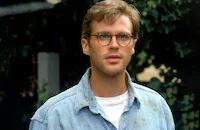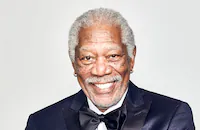Glory

Brief Synopsis
Cast & Crew
Edward Zwick
Matthew Broderick
Cary Elwes
Morgan Freeman
Denzel Washington
Dan Biggers
Film Details
Technical Specs
Synopsis
The story of the first black regiment to fight for the North in the Civil War. Lead by two idealistic young Bostonians, the regiment also includes an inspirational sergeant who unites the troops and a runaway slave who embodies the indomitable spirit of the 54th Regiment of Massachusetts.
Cast

Matthew Broderick

Cary Elwes

Morgan Freeman

Denzel Washington
Dan Biggers
Tom Barrington
Richard Wright
Mark Margolis
Keith Noble
Mark Jones

Bob Gunton
Afemo Omilami
Benji Wilhoite
Andrt Braugher
Randell Haynes
Michael Fowler
Bob Minor
Peter Michael Goetz
Mark A Levy
Christian Bashous
Peter Grandfield
Cliff De Young
Mark Woods
Pete Munro
John Finn
Marc Gowan
Donovan Leitch
Richard Riehle
Joan Riordan

Jihmi Kennedy
Raymond Godshall
J.d. Cullum
Sauntra Franks
Ronreaco Lee
Jay O Sanders
Ethan Phillips
Alan North
Daniel H Jenkins
Abdul Salaam El Razzac
Michael Smith Guess
Crew
Bill Abbott
Bill Abbott
Albert Aquino
John Ashby
Bruce Barbour
Guy Barnes
B H Barry
Robert Batha
Bob Behr
Tony Belmonde
Lon Bender
Lon Bender
Lon Bender
Norman Bielowicz
Stan Bielowicz
Vebe Borge
Kathie Boyles
Ralph Brandofino
Patricia Broderick
Alex Brown
Alonzo Brown
Weldon Brown
Tony Brubaker
Pieter Jan Brugge
Pieter Jan Brugge
Alan Bullard
Keith Bunting
Peter Burchard
Harold Burns
Everett Burrell
Hank Calia
Sarah Caplan
Joseph M Caracciolo
Frank Carrisosa
Andrew Casey
Jim Cavarretta
Don Cerone
Eric Chambers
Carl Ciarfalio
Karen E Collins
Mary Colquhoun
John Hock Conrad
Phil Cory
Marie Cosindas
Skip Cosper
Danny Costa
Stephen Crawford
Devon Curry
Louis D'esposito
Scott Dale
Gregg Dandridge
Carol Dantuono
T Battle Davis
Vincent Deadrick
Douglas F Dean
Vito Depalma
Nick Dimitri
J P Dolan
Lauren Doran
Billy Dowd
Dean Drabin
Fred Dresch
Syd Dutton
Robert Earnhardt
Mark Edwards
Gregg Elam
Ousaun Elam
Elle Elliott
Tracey Featherston
Michael Fedack
Dale E Fetzer
Freddie Fields
George Fisher
Sukey Fontelieu
Shelby Foote
Freddie Francis
Freddie Francis
Robert Frazen
George Frederick
Carl Fullerton
Robert J Garren
Ralph Garrett
Norman Garwood
Jerry Gatlin
Sidney Gecker
Scott Gershin
Dale Gibson
Ray Giron
Avram D Gold
Karen Gordon
Peter Grandfield
John B Griffin
Shay Griffin
William Gwaltney
Dick Hancock
Clifford Happy
Bill Hart
Orwin Harvey
Kevin Hearst
Jim Henrikson
Ray Herbeck
Eddie Hice
Chris Hogan
Alan Holly
James Horner
Martha J Huntley
Larry Huston
Ardie Ivy
Terry Jackson
Terry James
Francine Jamison-tanchuck
Kevin Jarre
Jeannie Jeha
Jeff Jensen
Carl Johnson
Mike Johnson
Harold Jones
Melvin Jones
Jerry Kadovitz
Tom Kaufman
Avy Kausman
Stan Keitt
Jack Keller
Steve Kelso
Patrice A Kiley
Wayne A King
Lincoln Kirstein
Daniel Kuttner
Paul Lane
Donna Larson
Doris Newman Layne
Kelly Learman
Lane Leavitt
Julian Ledger
Al Lee
Chet Leonard
Garrett Lewis
Irving Lewis
Steve Lillard
Maurice Lospinoso
Tom Luse
Karl Luthin
Danny Mabry
Steve Mann
Steven Mann
Eric Mansker
Mike Margaros
Anderson Martin
Benny P Massi
Sheila Mathews Allen
Steve Mathis
Joe Mayer
Rusty Mcclennon
Dwayne Mcgee
Bill Mcintosh
Bernie Mcpherson
Jimmy Medearis
Jimmy Medearis
Arthur Mendonza
Hans Metz
Lisa Miller
Bob Minor
Rita Minor
Donald O Mitchell
Bennie Moore
Jeff Moore
Merrick Morton
Alan Munro
Shawn Murphy
Vincent Nappo
Nick Nelson
Pat Newcomb
Perry Nichols
Ron Nichols
Bob Noland
Dan O'connell
Wade O'connor
Jeffrey A. Okun
John Orlebeck
Doug Ornstein
Kelly Oxford
Keith Pain
Briggs Palmer
E Palmisano
Connie Papineau
Doug Pellegrino
Manny Perry
Linda Peterson
Ron Pipes
Andrew Precht
Charles Quinlivan
Jeff Ramsey
C Alan Rawlins
Dan Rich
Mike Riley
Mario Roberts
Sean Rodgers
Pattee Roedig
John L Root
Frank Rose
Photo Collections
Videos
Movie Clip





Trailer
Hosted Intro
Film Details
Technical Specs
Award Wins
Best Cinematography
Best Sound
Best Supporting Actor
Award Nominations
Best Art Direction
Best Editing
Articles
Glory (1989)
Broderick is Union Gen. Robert Gould Shaw, a baby-faced Bostonian who's assigned to lead the 54th Massachusetts Volunteer Army, the first Black fighting regiment in the war. The men of the 54th are a scruffy collection of former and escaped slaves. We follow the men - including a rebellious, deeply embittered escaped slave named Trip (Washington), and a wise, emotionally-measured gravedigger named Rawlins (Freeman) as they're turned into soldiers. But first, they have to be accepted as human beings by the often brutal military officers that are training them. The men's inner and outward battles will finally come to a head during a horrific suicide mission at Carolina's Fort Wagner.
Zwick was careful when filming Glory not to turn it into a Black story with a more commercially convenient white hero. "We didn't want this film to fall under that shadow," Freeman said. "This is a picture about the 54th Regiment, not Colonel Shaw, but at the same time the two are inseparable." In order to assure accuracy, Zwick hired Shelby Foote, who would later become a semi-household name courtesy of Ken Burns' popular 1990 PBS nine episode documentary The Civil War, as a technical advisor.
It's interesting to note that Washington was reluctant to take on his role in Glory. "I had a lot of reservations about doing something like [Glory]," he said in a 1990 issue of Ebony magazine. "My father-in-law was a principal at one of the top Black high schools in North Carolina and he always told me the worst thing that ever happened was integration. In a lot of ways I agree with him, because we have gotten further and further away from (Black) culture." But he finally recognized that Glory gave him a shot at "an honest portrayal, a fully realized character." He accepted the role, of course, and won an Oscar® as a result.
In 1995, when he was promoting Courage Under Fire (1996), Zwick said he was unhappy about having to go to the Department of Defense to get help with his Gulf War picture. The generals wanted him to change a few scenes to their liking, and this infuriated him. He said he was convinced that this sort of government interference arises when bureaucrats with no writing experience try to shape a narrative that they're incapable of judging. And he used his experience on Glory to prove his point.
"[Glory] is shown today in Officer Candidate School as an example of the tribulations of leadership and as inspiration to the rank and file," he said. "Had I originally shown that script which describes racism, a whipping by a junior officer, incidents of all sorts of insubordination and questionable treatment to the Department of Defense, I do not think at that time they would have been able to support it."
Zwick's stance was that fact-based motion pictures such as Glory and Courage Under Fire require conflict, or they simply don't work. "Without conflict," he continued, "without a more textured portrait, you would have a recruiting film. That's fine when someone is making 'Be all that you can be commercials,' but that's not drama."
Glory received widespread critical praise upon release with Variety proclaiming that it "has the sweep and magnificence of a Tolstoy battle tale or a John Ford saga of American history." Vincent Canby, The New York Times film critic, concurred, writing "Glory is the first serious American movie about the Civil War to be made in years. There haven't been that many anyway - D.W. Griffith's Birth of a Nation (1915), Buster Keaton's The General (1927), David O. Selznick's Gone with the Wind (1939) and John Huston's The Red Badge of Courage (1951). Almost everything else has been balderdash...Although Glory employs the devices of fiction and sometimes is as brightly colored as a recruiting poster, it seems as severe as a documentary alongside those earlier films...Glory is celebratory, but it celebrates in a manner that insists on acknowledging the sorrow. This is a good, moving, complicated film." In addition to Denzel Washington's Best Supporting Actor Oscar®, Glory was nominated for four other Academy Awards including Best Art Direction-Set Decoration, Best Film Editing, Best Sound and Best Cinematography (by Freddie Francis); it won in the latter two categories.
Director: Edward Zwick
Producer: Freddie Fields
Screenplay: Kevin Jarre (based on the books Lay This Laurel by Lincoln Kirstein, One Gallant Rush by Peter Burchard, and the letters of Robert Gould Shaw)
Editor: Steven Rosenblum
Cinematographer: Freddie Francis
Music: James Horner
Production Design: Norman Garwood
Art Design: Keith Pain, Dan Webster
Special Effects: Kevin Yagher, Carl Fullerton
Set Design: Garrett Lewis
Costume Design: Francine Jamison-Tanchuck
Cast: Matthew Broderick (Col. Robert Gould Shaw), Denzel Washington (Trip), Cary Elwes (Cabot Forbes), Morgan Freeman (John Rawlins), Jihmi Kennedy (Sharts), Andre Braugher (Searles), John Finn (Sgt. Mulcahy), Donovan Leitch (Morse), John David Cullum (Russell), Alan North (Gov. Andrew).
C-122m.
by Paul Tatara

Glory (1989)
Quotes
Trivia
Miscellaneous Notes
Wide Release in United States January 1990
Released in United States on Video September 19, 1990
Re-released in United States on Video May 12, 1993
Released in United States on Video June 15, 1994
Released in United States February 1990
Released in United States December 1990
Shown at Berlin Film Festival (Panorama) February 9-20, 1990.
Shown at Cairo International Film Festival December 3-12, 1990.
Originally released by RCA/Columbia Pictures Home Video (video-USA)
Began shooting February 9, 1989.
Completed shooting April 27, 1989.
Released in United States Winter December 14, 1989
Re-released in United States on Video May 12, 1993
Released in United States on Video June 15, 1994
Released in United States February 1990 (Shown at Berlin Film Festival (Panorama) February 9-20, 1990.)
Released in United States December 1990 (Shown at Cairo International Film Festival December 3-12, 1990.)
Released in United States on Video September 19, 1990
Wide Release in United States January 1990
Released in United States Winter December 14, 1989


















